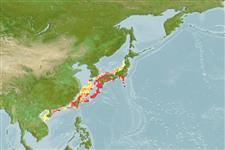Teleostei (teleosts) >
Perciformes/Scorpaenoidei (Scorpionfishes) >
Aploactinidae (Velvetfishes)
Etymology: Cocotropus: Greek, kokkos = berry, seed + Greek, tropsis, tropo = turning (Ref. 45335); keramaensis: Named after its type locality (Ref. 49352).
Environment: milieu / climate zone / depth range / distribution range
Ecology
Marine; demersal; depth range ? - 85 m (Ref. 49352). Subtropical
Northwest Pacific: off the Kerama Islands, Japan.
Size / Weight / Age
Maturity: Lm ? range ? - ? cm
Max length : 3.4 cm SL male/unsexed; (Ref. 49352)
Short description
Identification keys | Morphology | Morphometrics
Dorsal spines (total): 12; Dorsal soft rays (total): 10; Anal spines: 2; Anal soft rays: 7; Vertebrae: 26. 5 distinct preopercular spines, upper jaw longer than lachrymal, a single papilla on the posterior portion of the maxilla, the outer edge of the lower jaw with 4 distinct papillae, first sensory pore of the lower jaw on both sides fused, an anterior tip of the isthmus attaining to the fifth sensory pore of the lower jaw, and anterior 4 dorsal spines anterior to third neural spine (Ref. 49352). Caudal fin rounded posteriorly (Ref. 49352).
Minimum depth from Ref. 58018.
Life cycle and mating behavior
Maturity | Reproduction | Spawning | Eggs | Fecundity | Larvae
Imamura, H. and G. Shinohara, 2003. Cocotropus keramaensis, a new species of the family Aploactinidae (Teleostei) from the Kerama Islands, southern Japan. Ichthyol. Res. 50(3):233-238. (Ref. 49352)
IUCN Red List Status (Ref. 130435: Version 2024-1)
Threat to humans
Harmless
Human uses
Tools
Special reports
Download XML
Internet sources
Estimates based on models
Phylogenetic diversity index (Ref.
82804): PD
50 = 0.5000 [Uniqueness, from 0.5 = low to 2.0 = high].
Bayesian length-weight: a=0.01288 (0.00419 - 0.03963), b=3.03 (2.77 - 3.29), in cm total length, based on LWR estimates for this (Sub)family-body shape (Ref.
93245).
Trophic level (Ref.
69278): 3.2 ±0.3 se; based on size and trophs of closest relatives
Fishing Vulnerability (Ref.
59153): Low vulnerability (10 of 100).
